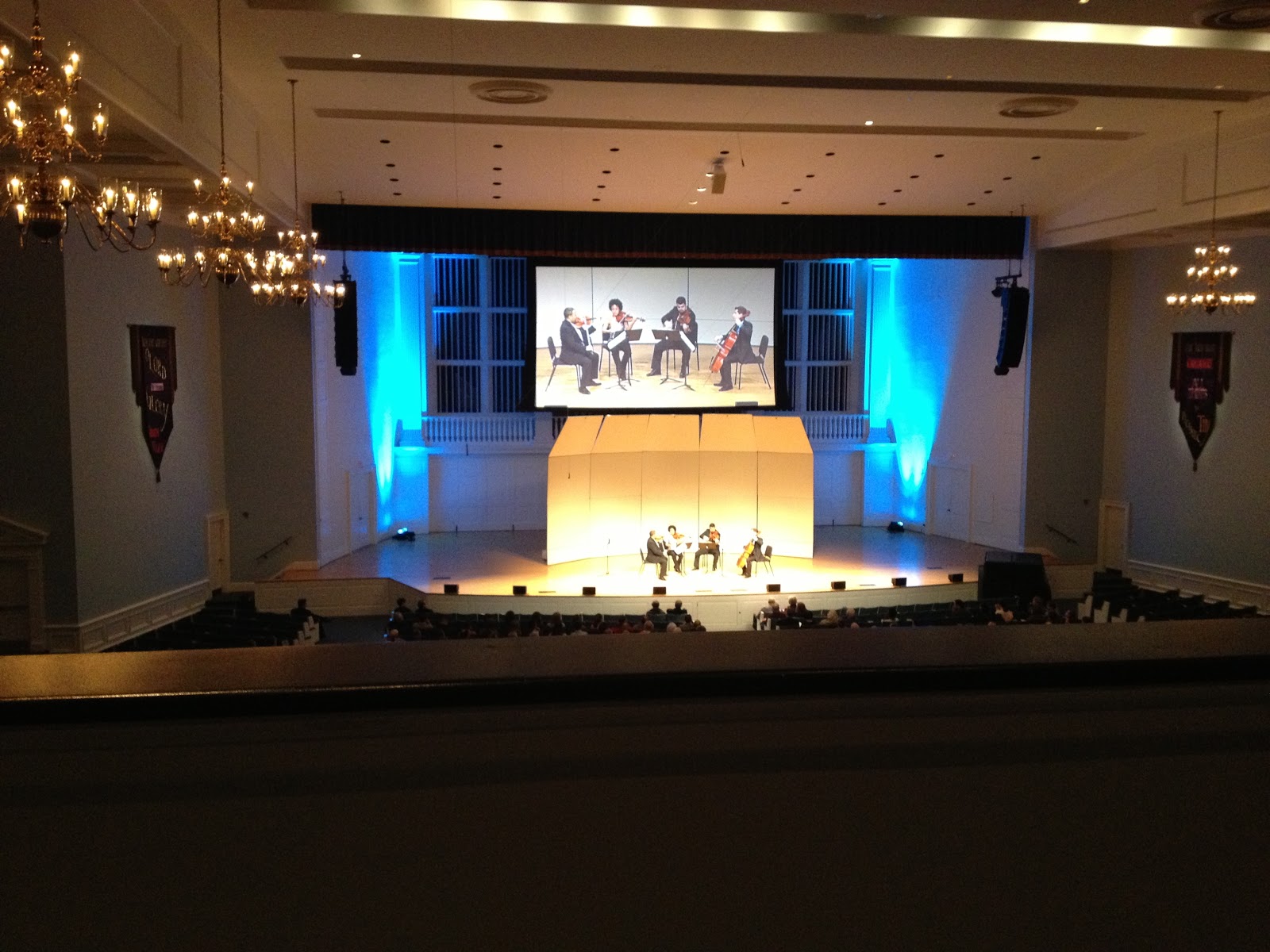=======
Wheaton College Symphony Orchestra
Concerto Competition Honors Concert
Friday, March 1
Edman Memorial Chapel, Wheaton College, Wheaton, Illinois
I began March with what had been one of my most-anticipated events as an undergraduate music major, the Wheaton College Concerto Competition Honors Concert. In October/November of each year are the four divisional concerto competitions (generally with piano accompaniment), and the winner of each division then performs his or her piece with the full orchestra in the first part of the spring semester. This concert also features a performance of the piece that won that year’s Alumni Composition Prize.
The concert began with that winning piece, David Christensen’s This is a Poverty for soprano voice, alto voice, piano, and percussion. The text includes excerpts from the Bible, famous speeches, and a fictional Twitter feed. I had not heard a work like it before, and I applaud David for his creativity.
The orchestra took the stage and the four divisional winners performed: Mark Franklin, Rebecca Weddle, and Justin David played a Carl Maria von Weber piano concerto, Samuel Barber violin concerto, and Mozart clarinet concerto, respectively, and Olivia Doig sang an aria from Rossini’s The Barber of Seville. All four played or sang with obvious passion and enjoyment, not to mention technical and artistic brilliance. I had missed last year’s Honors Concert (my first year after graduation), so I was glad to be able to see this year’s, one of the last years in which I will actually know the soloists and composer.
Chicago Brass Festival
Chicago Brass Band
Fine Arts Center Auditorium, Northeastern Illinois University, Chicago, Illinois
The 2013 Chicago Brass Festival featured several concerts, including this one that I saw, by the Chicago Brass Band, under the direction of Dr. Colin Holman. The CBB describes itself as “formed in the British band tradition but with a Chicago flair.” It is certainly a musically excellent and sonically powerful group.
The showpiece of their program (though all their selections
were well-received) was “‘Rextreme’ Concerto No. 2 for Trumpet” by James M.
Stephenson (who was present) with virtuoso Rex Richardson playing the solo
part. The piece is something of a showcase of a trumpeter’s skills – and I say
trumpeter, not trumpet, intentionally, for Mr. Richardson used no fewer than
three different instruments: a Bb trumpet, piccolo trumpet, and flugelhorn.
Chicago Symphony Orchestra
Bronfman plays Bartok
Tuesday, March 12
Orchestra Hall, Symphony Center, Chicago, Illinois
This concert was not one I had really been considered until
an invitation arrived to attend a special pre-concert event. The Institute for
Learning, Access, and Training at the Chicago Symphony Orchestra was releasing
a new set of Dream Out Loud media, and had invited Chicago-area educators for a
preview and brief remarks. The invitation came with an offer of a discounted
ticket to the concert. I was only able to enjoy the first half of the concert,
but there were more than enough musical treats before intermission.
The first work was Debussy’s Prelude to “The Afternoon of a Faun.” Not being a flutist or a
scholar of French classical music, I know the piece more by reputation than
anything else, but I enjoyed the peacefulness of the music – a ten-minute oasis
of gentle music in the middle of a bustling city on a weeknight.
After a set change, it was now time for Bartok’s Second
Piano Concerto. Not being a piano player (can you tell why this concert was
never on my list to begin with?), I knew nothing about this piece, so I had
spent a few minutes with Wikipedia that afternoon to learn what was coming. I
learned that it was one of the most difficult pieces in the repertoire.
It showed. From my vantage point in the front row of
gallery, I had an unobstructed if distant view of soloist Yefim Bronfman’s
ferocious technique. I was also thrilled to see and hear that this concerto
required quite a bit of work from the low brass section – all the wind players
really; there were a few minutes when the piece could have been appropriately
titled Concerto for Piano and Wind Ensemble. The concerto is written in an arch
form, with fast outer movements and a slow inner movement – and an inner
movement with a fast middle.
In response to a standing ovation, Bronfman played a short
work by Scarlatti as an encore, before waving good night.
Wheaton College Artist Series
Harlem String Quartet
Friday, March 22
Edman Memorial Chapel, Wheaton College, Wheaton, Illinois
After a heavy-duty mid-season for the Artist Series, the
last quarter began with a smaller yet still excellent act, the Harlem String
Quartet. The Harlem Quartet is a relatively young group, only first formed in
2006. In addition, the current violist and cellist have only been with the
group since November. Harlem was formed by a separate entity, the Sphinx
Organization, which administered scholarship competitions for young Black and
Hispanic musicians.
Harlem brought a diverse program, beginning with a Mozart
quartet, making their way through Chick Corea’s “Adventures of Hippocrates” and
Billy Strayhorn’s “Take the A-Train,” and concluding with Schubert’s “Death and
the Maiden” Quartet.
With the exception of “A-Train,” which I knew from my school
jazz band days, the other items were unfamiliar to me (though I knew the name
and reputation of the Schubert quartet), so it was a treat to be introduced to
some new music. All of it was played with precision and passion – the best
concerts, in my opinion, are those where the musicians are clearly enjoying
their work, and Harlem was decidedly doing so.
 |
| The Harlem String Quartet in Edman Chapel |
Have you heard any good concerts lately? Share a review in the comments section below!
